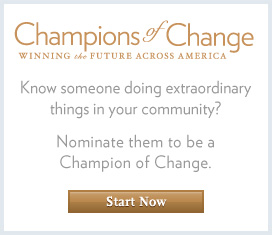Champions of Change Blog
"Mobilize Veterans to Feed America"
Posted by on March 21, 2013 at 8:03 AM EST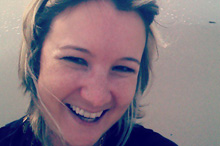 Tia Christopher is being honored as a Champion of Change for her efforts as a woman veteran.
Tia Christopher is being honored as a Champion of Change for her efforts as a woman veteran.
People often ask me about my military experience. As a very vocal military sexual assault survivor and advocate, I think it is often assumed that I feel a certain way or see my experience in the military as a bad thing. It is actually the opposite. I am always going to be proud I served, even if it was only for a year. Both sides of my family have served in the Navy, as pilots, submariners, officers, and enlisted. I feel honored to be a part of that tradition.
What I tell people about my short time in the service is that it taught me my physical, mental, and emotional limits at a very young age. I would not be the woman I am today or be able to be the advocate, leader, and friend that I am. Has it been hard? Yes. On one hand I get to help clinicians learn how to work with veterans with PTSD and explain to them the difference between sexual trauma in the military versus the civilian world – work that I love and am very proud of. Yet the other side of the coin is living with PTSD. It has gotten easier, but my basic makeup has been altered by the trauma I have survived.
Over the years I have worked with veterans just getting out of the military, helping to explain their benefits and plug them into community and government resources. I have written policy papers and spoken before audiences that ranged from college students to legislators to the media about Military Sexual Trauma (MST) and the changes and reforms needed. The limits that I learned about myself as a nineteen-year-old sailor helped me see when it was time to move on and grow, and I am proud that a new generation of women veterans is now speaking about MST and the positive changes that are possible.
Today I serve as Chief of Staff for the Farmer Veteran Coalition. Our mission is to “Mobilize Veterans to Feed America.” We work with returning veterans and veterans of all eras who are starting careers in food and farming. Just like veterans need jobs, our country needs more farmers. It is exciting and rewarding to be a part of our country’s food movement while still working with the population I love: vets. Both in my current post and over my years in the veteran advocacy field, I have worked with and befriended so many amazing veterans. Our network of veterans helping veterans stretches across the country. A lesson that has stayed with me from my time in the military is how much harder I can push myself with the support and encouragement of my shipmates. That is a tradition I have been proud to continue in the veteran community.
Tia Christopher serves as Chief of Staff for the Farmer Veteran Coalition in Davis, California.
Learn more aboutChampions of Change: African American Educational Excellence
Posted by on February 27, 2013 at 5:04 PM ESTYesterday, we held a Champions of Change event honoring leaders who have advanced educational excellence for the African American community.
We bring in ordinary Americans who are doing extraordinary things in their communities, all across the country. We call them “Champions of Change.” It’s been a very busy and exciting African American History Month, and yesterday’s event was a vital part of the celebration.
During the Champions of Change event, we recognized 10 individuals who have devoted their time and efforts to improve educational outcomes for African American students. These amazing leaders are making a difference in their communities, whether at the local, state or regional level. And they embody the spirit of the new initiative that was launched last year.
President Obama signed an executive order establishing the White House Initiative on Educational Excellence for African Americans. He established it so that every child has access to a complete and competitive education from the time they're born, through the time they get a career. Yesterday, Secretary of Education Arne Duncan made a guest appearance to introduce the new Director of the Initiative, David Johns.
The Initiative works across Federal agencies and with partners and communities nationwide to produce better education programs for African American students.
The goal is to make sure that all African American students receive an education that fully prepares them for high school graduation, college completion, and productive careers.
As advocates, motivators, volunteers and leaders, these champions’ efforts to advance this mission in their communities are nothing short of heroic.
Whether they are spearheading teen mentoring programs, advocating for students with special needs or disabilities, or addressing school absenteeism, their work and involvement is the key to helping our all of our children thrive in their schools and communities.
Our champions had a lively and vibrant discussion during the event—they shared powerful stories about their neighborhoods and backgrounds that moved them to action.
For example, many of the panelists spoke about the enormous influence of their parents and social networks, and asked how we could incorporate family support structures into advancing education for African Americans.
They also came up with some takeaways: the importance of showing love and support to young people, especially the ones that are struggling, thinking about their needs upfront, and asking young people to tell their stories and dreams so that adults can get a better idea of what works for them.
The President had a similar message a couple weeks ago in Hyde Park Academy in Chicago. During his speech, he said, “in America, your destiny shouldn’t be determined by where you live, where you were born. It should be determined by how big you’re willing to dream, how much effort and sweat and tears you’re willing to put in to realizing that dream.
He also spoke of “ladders of opportunity,” giving our next generation a leg up to enter the middle class. That includes raising minimum wage, keeping our children safe, and high quality education.
As President Obama said in his Chicago speech, even as the government tries to build these ladders, we know that we can’t do it alone. It will require the efforts of everyone to create a better future for our country. Our Champions of Change inspire us to see that one person can make a huge difference.
Learn more about EducationClosing Gaps
Posted by on February 27, 2013 at 2:15 PM EST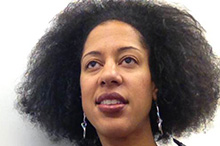 Erin Jones is being honored as a Champion of Change for her efforts in local innovation.
Erin Jones is being honored as a Champion of Change for her efforts in local innovation.
My passion to become a public school educator began on the basketball court. After a year of college in a predominantly white, affluent community, I was convinced I did not belong in this country. I had grown up overseas, so although I looked like the few other black people who lived or worked on campus, I was an outsider. To the white community, I was a black woman, for whom they had low expectations. I felt so alone and so alienated that I actually considered suicide.
The summer after my freshman year, I discovered a little black community within miles of my college. In the middle of that community was an outdoor basketball court. I stepped out on the court as the only female, the only college student, the only “outsider.” On that court, no one cared that I was adopted, that my parents were white or that I had grown up in another country. They cared that I could play ball. I became “one of the guys.” For the first time, I belonged.
Between games, the guys would sit and talk about life. Hopelessness was rampant. These young men did not expect to live to be 21. None of them had finished high school. Not one knew of anyone who had attended college. They spoke of high schools in which the focus was security, not education, where there were often more students than chairs or books. My life mission became clear. I had been raised as a black child in a country that saw no race, in a school that saw each and every student as gifted. I had come to America with a dream to change the world, with hopes of becoming a lawyer and working for the United Nations, but the greatest social justice issue of the 20th century was staring me in the face: young black men needed a public school system that served their needs and set them up for success beyond the basketball court.
After a summer on that basketball court, I made a decision: I would change education in this country to ensure that every black boy received a great education and had the option to attend college. I soon discovered that the problems in our system are much broader than what was happening with black boys. Zip code, race, and home language continue to be the greatest predictors of the quality of education a child will receive, and this is a travesty. There is still much work to be done, but it has been my honor to work towards the improvement of education for all children in this country, from Philadelphia to South Bend, from Columbus to Tacoma, from Spokane to Olympia and now Federal Way. Our children cannot be described by achievement gaps. The system - public education and American culture, in general - has created gaps in opportunity and expectation, and it is my goal to be part of closing those gaps.
Erin Jones is the Director of Equity and Achievement for the Federal Way School District in South Seattle
After Helen Keller: Empowering Students with Disabilities
Posted by on February 27, 2013 at 2:00 PM EST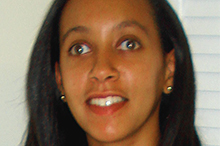 Haben Girma is being honored as a Champion of Change for her efforts in Educational Excellence for African Americans.
Haben Girma is being honored as a Champion of Change for her efforts in Educational Excellence for African Americans.
Dedicated teachers are essential to a good quality education, especially for students with disabilities. I strive to kindle the passion of those who have chosen this sometimes stressful yet incredibly valuable career, and inspire students to learn the secret to success that is self-advocacy.
In November I gave a keynote at the North Carolina Conference for Exceptional Children. There, I met a young DeafBlind girl and her mother. Over a year ago the two of them watched one of my speeches on YouTube. After listening to the speech, the girl told her mother, “Play it again! She’s the only one who understands me.” Hearing this story at the conference, I found that I did in fact understand. I, too, longed for a strong DeafBlind role model at age eleven. Helen Keller, while inspirational, offers very little guidance for a DeafBlind woman in the 21st Century. The sad fact is that students with low incidence disabilities and their teachers struggle to find strategies that enable them to overcome challenges in classrooms and social settings. When unable to find solutions in their local communities, teachers and families tap into national networks like the Office of Special Education Programs, the Helen Keller National Center, Perkins, and the National Federation of the Blind. Through speeches and workshops around the country, I use my own story of growing up with exceptional teachers to stress the importance of using technology and creative problem solving skills to develop solutions for students.
The most important lesson I received from my special education teachers was self-advocacy. It was through persistent self-advocacy that I convinced my father to let me spend three weeks of my sophomore year of high school building a school in Mali through BuildOn. My father had perfectly valid worries: how would a DeafBlind girl survive in an African village, let alone build a school? Through my determination and the optimism of BuildOn’s leaders, I succeeded in both earning my father’s blessing and making a place for myself among the brick-making, shoveling, and culture sharing.
When teachers develop self-advocacy skills in students, those students grow up to become advocates for others. As part of DeafBlind Young Adults in Action, I spent a week teaching advocacy skills to DeafBlind young adults from around the country. We have been working together to establish a new organization, DeafBlind Citizens in Action, that would bring a stronger voice to the national scene. I recently joined hundreds of blind Americans in educating legislators about issues facing the blind, such as the TEACH Act, during the National Federation of the Blind’s Washington Seminar. Last but not least, in Massachusetts I serve on the Board of Directors for Deaf, Inc., a non-profit organization empowering the Deaf and DeafBlind to lead independent live.
As a Skadden Fellow at Disability Rights Advocates, I will use the skills I have been developing at Harvard Law School to expand educational opportunities for students with disabilities. Many colleges and universities have historically failed to ensure that students with print disabilities have equal access to instructional materials. This problem is being compounded as schools transition from inaccessible print to inaccessible digital materials. At this critical moment schools have the unprecedented opportunity to use technologies with accessibility features, such as Apple’s iPads, that have the capacity to allow students with disabilities to use the same materials at the same time as non-disabled students. When investing in new technologies, schools should first research which technologies would benefit all rather than just some of their students. Schools that use inaccessible instructional materials violate the Americans with Disabilities Act and Section 504 of the Rehabilitation Act. Alongside other advocates, I will work to remove digital barriers that deny equal educational opportunities to students with disabilities.
Haben Girma is a student at Harvard Law School
Education Is Our Ticket Out: Yes We Can
Posted by on February 27, 2013 at 1:45 PM EST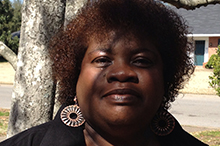 Joyce Parker is being honored as a Champion of Change for her efforts in Educational Excellence for African Americans.
Joyce Parker is being honored as a Champion of Change for her efforts in Educational Excellence for African Americans.
My selection as a White House Champion of Change is truly a highlight in my life and, needless to say, an unexpected one. I was told that this recognition is being done to spotlight the contributions I have made in my community to further African American Education. I must admit that there are so many folks traveling with me that I was almost reluctant to accept this honor. But, as I thought it out, I realized that I must accept it on behalf of all of those who have been and still are on this journey of ensuring that the children of our community, our state, and our nation receive the best education possible. They deserve it, and we owe it to them. Anything I have done and can do to make this happen has been in the midst of all of my colleagues, allies, family members and friends.
I am the great-granddaughter of a slave who raised her granddaughter. My 96 year old mom was married over 70 years to my dad who would have turned 103 on March 18th of this year (he passed on his 94th birthday). My mom received an eighth grade education and my dad a sixth grade education. She was a cook and he was a cab driver. They valued education and passed it on to me and my siblings. They had four of my siblings enrolled at Jackson State University at one time. My dad made two trips (over two hours each way) to pick up my brother one night after not being able to locate him. I will never forget the humility and commitment of my parents to be parents, providers, and supporters of me and my siblings. My mom was on the PTA and actively participated in our school lives. She was and still is the driving force behind what I do. She always believed in us, and she and my father spared no pain in making sure we reached our full potential. But what they both brought to the table was that notion that we would not travel this road alone: we must bring others with us by lifting as we climb, something I am sure my mom got from her grandmother, who always made sure that the other families on the plantation shared in whatever she had. My mom became a dean of Christian Education and has and continues to write her life story. She has read the Bible through and through and still reads it daily by opening it up to a page and trusts that this is her word and/or mission for the day.
My philosophy is deeply rooted in these great souls that I call family. I do not have children and truly applaud every parent. However, all of my sisters and brothers have children and, according to my nieces and nephew, everyone needs an Aunt Joyce. The reason is because, according to them, I feel guilty when I say NO. Therefore, unlike their moms and grandmom, my usage of no is ultimately ineffective.
I am optimistic and this has driven the work that I do with parents and students because, when I look at the world through their eyes, this is what they seem to need more than anything. I am the "yes we can" person. I am the encourager to those who dare to dream. It is so exciting to me to take on the challenge that families in our communities face daily just trying to do what is so natural: to ensure that each generation has a better life that the one before it. For African Americans, education is our ticket out. I work with families of children with disabilities to overcome the stigma that is attached and the low expectations associated with this population of students. My role is to be the person that sees the vision and works hard to make sure others see it and find their role in making it happen.
We work with families by forming support groups where parents and students come together to work out their paths to success. One group of parents wanted to have their children more integrated in the community and not be invisible, so I had the bright idea to host events that would make this a priority, such as a picnic in the park where our youth group and their parents hosted and did the cooking for this group of children and their families. We take a picnic for granted, but one of the parents shared her gratitude and said that it had never been possible before for all of the family to come out together because someone would have to stay home to be a caregiver to the challenged child. Now, for Thanksgiving and Christmas weekends, we do breakfast and a movie with these families. We also found that we needed to give these parents a visual that would support them as they developed their children’s IEPS so we give them educational gifts that could be used in the classroom and at home. They could speak about the socialization component that is not truly effectively addressed in IEPs. This parent support group has taken it even further by using the model of the picnic and the movie to forming the only camp in the Delta of Mississippi for children with limited abilities called Camp Looking Glass.
I attend IEP meetings as well as disciplinary conferences that, in my opinion, always have academic implications. We formed a support group call Parents on Patrol for Success to meet the needs of a group of mothers who had been called to the high school in response to a rash of fights involving their children. Our organization was called in to this meeting, and found a group of frustrated mothers who did not know where to turn or what to do. We met with these parents and asked “if they could do something to stop the fighting, what would it be?” Their suggestion was to become parents-on-patrol in the building for success versus arrest. We bought t-shirts and got the district to agree to provide these parents the opportunity to become part of the solution. Within two weeks, the halls were clear, the fights subsided, and these parents were applauded by the staff of the school, the students, and other parents for their willingness to make the sacrifice for our children.
Others on this journey with me are those parents and students who meet and come up with strategies and plan about how to get everyone to believe that all children can be educated, one child at a time. My mentor, Leroy Johnson, coined the phrase that, in low wealth communities of color, those who are impacted the most by policies are rarely those who are part of the making of policies. Thus, our theory of change relies heavily on the notion that parents and students must become the “Architects of policies and not just the objects of policies.” A quality education is a human right that can no longer be denied if this country is to survive and grow into a nation of the people and for the people.
Joyce is the Director of Citizens for a Better Greenville
Black Star
Posted by on February 27, 2013 at 1:30 PM EST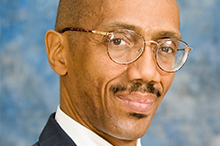 Phillip Jackson is being honored as a Champion of Change for his efforts in Educational Excellence for African Americans.
Phillip Jackson is being honored as a Champion of Change for his efforts in Educational Excellence for African Americans.
The Black Star Project was founded in 1996 as a 501(c)(3) organization designed to eliminate the racial academic achievement gap among Black, Latino, White, and Asian students. It is now committed to creating a globally-competitive education for all children in Chicago, and to influencing others around the country to do the same. From its humble beginnings in 1996 with one staff member working with three schools, The Black Star Project employed nearly 200 people (including full- and part-time staff, interns and consultants) in 2012 and works with thousands of schools with its various programs, campaigns, and initiatives. In the Chicago area, its efforts have touched the lives of nearly 300,000 students and parents since 1996.
The Black Star Project’s flagship program is the Student Motivation/Mentoring Program, which sends medical, legal, financial, and other professionals into Chicago schools each day of the school year to inspire, motivate, nurture, and guide youth toward their future roles in society and to encourage them to do well in school in order to improve themselves, their families and our country. Last year, this program served 14,000 youth in 65 schools.
The Black Star Project’s best nationally-known program is the Million Father March. For the past two years, one million fathers across America have taken their children to school on their cities’ first school day. When fathers are involved in their children’s education, children maintain better attendance, gain higher test scores, earn better grades, and are more likely to graduate from high school. Additionally, they are less likely to be suspended, expelled, involved in fights or bullying, become involved with gangs and drugs, or have children prematurely. More than 800 American cities have participated in the Million Father March since its inception in 2004. Last year, the largest March activity occurred in Broward County Florida, where more than 39,000 fathers took their children to school on the first day.
We cannot fix the most pressing internal problems of America, until we fix the problems of parents, families and communities in America. The Black Star Project has created the Toyota/Black Star Parent University, one of the largest and most comprehensive efforts in this country to teach parents to be effective. Thousands of parents have participated in nearly 600 parenting courses designed and facilitated to help them improve parenting skills and to share tips, techniques and general information to help parents responsibly manage their families, including becoming active in ways that improve their communities. These courses are facilitated by specially-trained, parent-friendly professors and are offered in schools, churches, libraries, park district facilities and other community centers. We don’t wait for parents to come to us, we go to them. Good parents generate better families and communities, which produce more academically capable, socially-balanced and better-prepared students for our schools, and better citizens for our society.
And finally, our newest program which is having a profound impact on education in Chicago is the Saturday University. These free community-driven, community-operated learning centers help guarantee that children will have the basic academic skills needed for success in school and in life. In Chicago, The Black Star Project operates 20 Saturday University sites for 350 students in churches, schools, community centers, park district facilities and even one in a police station. These once-a-week learning opportunities maintain a small 1 to 6 teacher/student ratio to enhance and accelerate their focus on reading, writing and math. The Black Star Project staff and volunteers also mentor all of our students. Organizations in at least 15 other cities in the United States have asked for information to start their own Saturday University.
He is founder and executive director of The Black Star Project
- &lsaquo previous
- …
- 79
- 80
- 81
- 82
- 83
- 84
- 85
- 86
- 87
- …
- next &rsaquo

